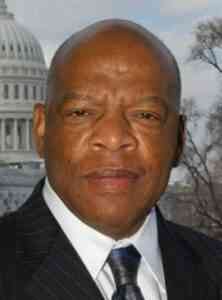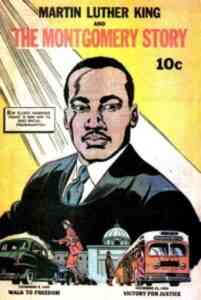Trilogy of comics tells the story of Congressman John Lewis and the sweeping epic of the Civil Rights Movement
When Andrew Aydin first suggested that late Georgia Congressman John Lewis write a comic book about his life, the legendary civil rights icon had a typically acerbic response.
“I thought the boy had lost his mind,” Lewis told a reporter later.
Aydin eventually convinced Lewis, and Aug. 13 marks the 10th anniversary of the publication of “March,” the best-selling autobiographical graphic novel Lewis co-wrote with Aydin.
The response to the comic, which was turned into a trilogy, made it one of the most lauded and best-selling graphic narratives of the 21st century. In the decade since its publication, Aydin, Lewis, and illustrator Nate Powell have received dozens of awards for their remarkable collaboration.
In 2014, “March: Book One” became the first comic to win a Robert F. Kennedy Book Award. Two years later, the final book in the trilogy became the first comic to win a National Book Award.
“March: Book Three” subsequently earned more awards from the American Library Association than any book in history. A list of awards the trilogy has received can be found on Aydin’s website here.
The novels have an impact on more than the critics. A 2019 Comic Book Legal Defense Fund survey indicated that the “March” trilogy had become the second most widely taught graphic novel in America’s schools.

“We have to teach (children) this history, and we have to teach them in their language,” Aydin says.
Aydin says he first got the idea for the book while working as press secretary on Lewis’ 2008 reelection campaign. He told his fellow staffers he planned to go to Dragon Con one day.
His colleagues scoffed, but Lewis told them how comic books helped engage him in activism.
“Congressman Lewis told them, ‘Don’t laugh. There was a comic book during the (Civil Rights) Movement, and it was very influential,’” Aydin says.
That comic, “Martin Luther King & The Montgomery Story,” was published when Lewis was a teenager. It detailed how King helped lead the 1955-1956 boycott that integrated the bus system in Montgomery, Alabama.

Aydin said the 16-page graphic novel about King was also life-changing for him. Working later on a master’s degree from Georgetown University, he wrote his 2012 thesis on the work. And that thesis became the first long=form history written about the historic comic book.
But in Congressman Lewis’ 2008 campaign, Aydin kept working to convince Lewis, determined to talk him into writing a similar comic about his contributions to the movement. Lewis finally agreed.
“He said, ‘OK, I’ll write it – but only if you write it with me,’” Aydin says.
The process of writing, publishing, and promoting the graphic novel forged a lifelong bond between Aydin and Lewis, who died in 2020 at the age of 80. In a joint appearance at the 2016 National Book Festival, Lewis told the audience that Aydin has become like a son to him.
He also touched on the need for the younger generations to get involved in what he famously called “good trouble.”

“When you see something that is not right, not fair, not just, you have a moral obligation to stand up, to speak up, and speak out,” Lewis said. “To get in good trouble. Necessary trouble.”
Aydin says the purpose of “March” is to inspire people of all ages, especially teens and young adults, the way “Martin Luther King & The Montgomery Story” did for the then-17-year-old Lewis. He called his and Lewis’ collaboration a “roadmap” for the next generation.
He said a roadmap is particularly critical in today’s political backlash against the rights of people of color, the LGBTQ+ community, and other marginalized communities.
“It’s incredibly important to focus on ‘March’ (10 years later),” Aydin says. “It’s a story that teaches young people about their power. The unfortunate reality is that for quite some time but especially right now, there are forces at work who do not want young people to stand up for themselves.”

